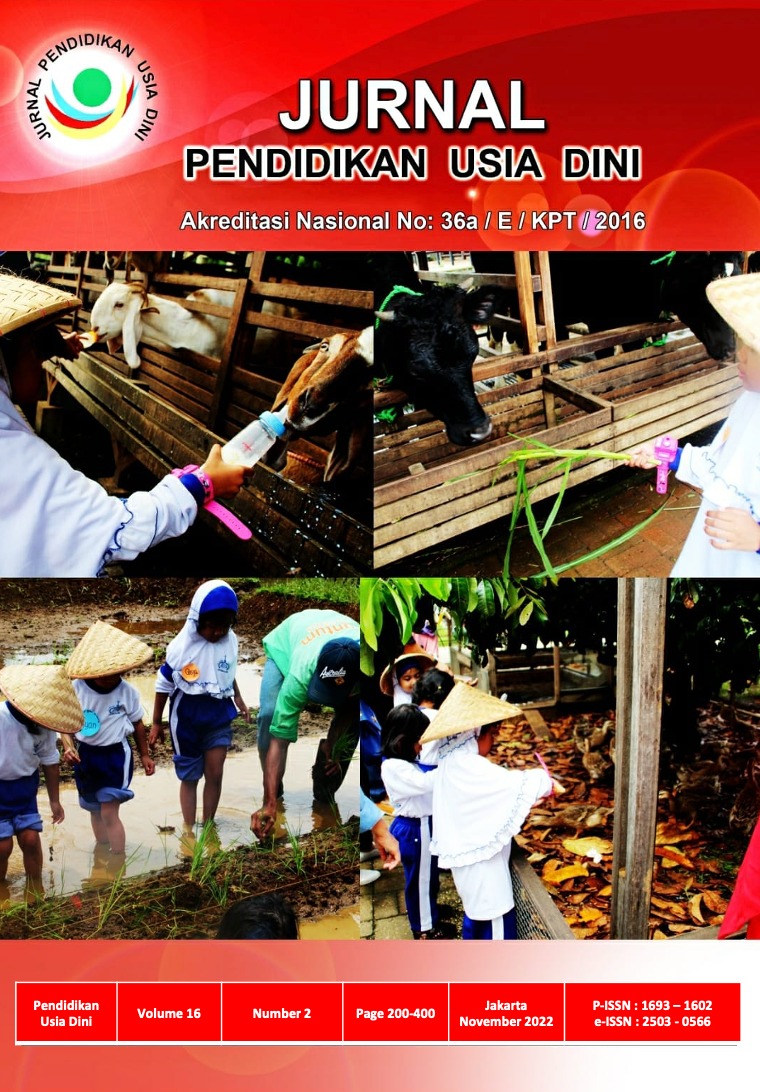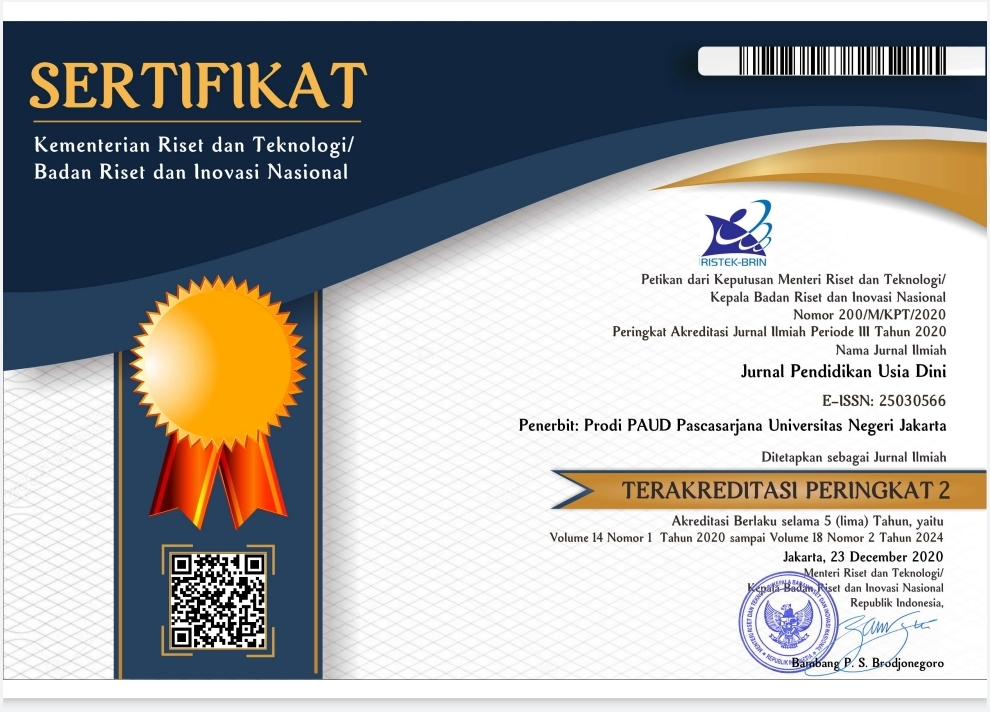The Effectiveness of Toilet Training on Children's Independence Through Demonstration Methods
DOI:
https://doi.org/10.21009/JPUD.162.04Abstract
Toilet training is one way to train children's independence in clean and healthy living behaviour as a provision for children's life skills in entering the next education level. The research problem is that the child's independence has not yet developed, which is marked by the child not yet being independent in defecating and urinating. The research aims to train children's independence in defecation and urination through demonstration methods and find out whether toilet training activities through demonstration methods can affect children's independence. The research subjects were 50 children. A research approach is quantitative with experimental methods. The data collection technique used pre and post-tests for children's independence with the child's toilet training ability as a measuring tool. The results of data collection were processed by statistical testing the Non-Parametric Wilcoxon Signed Ranks Test. The study found a contrast in toilet training ability before and after being treated with a demonstration technique which has a value of 0.05 with a P value <0.005. The research results conclude that the toilet training demonstration method was effective in increasing children's independence in Kindergarten, Donggala Regency, Central Sulawesi.
Keywords: early childhood, toilet training, independence skills
References:
Baird, D. C., Bybel, M., & Kowalski, A. W. (2019). Toilet Training: Common Questions and Answers. 100(8).
Campbell, D. T., & Stanley, J. C. (2015). Experimental and Quasi-Experimental Designs for Research. Ravenio Books. https://books.google.co.id/books?id=KCTrCgAAQBAJ
Cerino, A. (2021). The importance of recognising and promoting independence in young children: The role of the environment and the Danish Forest school approach. Education 3-13, 1–10. https://doi.org/10.1080/03004279.2021.2000468
Choby, B. A., & George, S. (2005). Toilet training. American Family Physician, 78 9, 1059–1064.
DeLuca, C., Pyle, A., Braund, H., & Faith, L. (2020). Leveraging assessment to promote kindergarten learners’ independence and self-regulation within play-based classrooms. Assessment in Education: Principles, Policy & Practice, 27(4), 394–415. https://doi.org/10.1080/0969594X.2020.1719033
Devries, M. W., & DeVries, M. R. (1977). Cultural relativity of toilet training readiness: A perspective from East Africa. Pediatrics, 60 2, 170–177.
Febrianti, A. (2021). Demographic Characteristics of Mothers with Toilet Training Ability in Children. Jurnal Kesehatan Abdurrahman, 10(1), 48–57. https://doi.org/10.55045/jkab.v10i1.122
Hildebrand, V. (1988). Young Children’s Self‐care and Independence Tasks: Applying Self‐Efficacy Theory. Early Child Development and Care, 30(1–4), 199–201. https://doi.org/10.1080/0300443880300116
Hooman, N., Safaii, A., Valavi, E., & Amini-Alavijeh, Z. (2013). Toilet Training in Iranian Children: A Cross-Sectional Study. Iranian Journal of Pediatrics, 23, 154–158.
Khoiruzzadi, M., & Fajriyah, N. (2019). Learning Toilet Training in Training Children’s Independence. JECED: Journal of Early Childhood Education and Development, 1(2), 142–154. https://doi.org/10.15642/jeced.v1i2.481
Kiddoo, D. A. (2012). Toilet training children: When to start and how to train. Canadian Medical Association Journal, 184(5), 511. https://doi.org/10.1503/cmaj.110830
Kiftiyah, K., Wardani, R. A., & Rosyidah, N. N. (2018). The Effect of Demonstration Methods About Toilet Training on Improving Toilet Train-ing Learning In Children Aged 3 Years In Paud I Sooko Village, Sooko District, Mojokerto Regency. Nurse and Health: Jurnal Keperawatan, 7(1), 71–79. https://doi.org/10.36720/nhjk.v7i1.35
Klassen, T. P., Kiddoo, D. A., Lang, M. E., Friesen, C., Russell, K., Spooner, C. H., & Vandermeer, B. (2006). The effectiveness of different methods of toilet training for bowel and bladder control. Evidence Report/Technology Assessment, 147, 1–57.
Meilisa, A. N., Hasanah, O., & Amir, Y. (2022). Relationship between Toilet Training Initiation Age and Factors Affecting Toilet Training to Toilet Training Achievements. Indonesian Health Scientific Journal, 7(1).
Mota, D. M., & Barros, A. J. D. (2008). Toilet training: Methods, parental expectations and associated dysfunctions. Jornal de Pediatria, 84(1), 9–17. https://doi.org/10.2223/JPED.1752
Ngatemi, Purnama, T., & Kasihani, N. N. (2021). Independence of Brushing Teeth to Free-Plaque Score in Preschool Children: A Cross Sectional Study. Indian Journal of Forensic Medicine & Toxicology. https://doi.org/10.37506/ijfmt.v15i3.15875
Polaha, J., Warzak, W. J., & Dittmer-Mcmahon, K. (2002). Toilet training in primary care: Current practice and recommendations from behavioral pediatrics. J Dev Behav Pediatr, 23(6), 424–429. PubMed. https://doi.org/10.1097/00004703-200212000-00005
Rahayu, S. F. (2022). Relationship Pattern of Working Parents To The Independence Of Toilet Training Pre School Children (Literature Study). Healthy-Mu Journal, 4(2), 82–87. https://doi.org/10.35747/hmj.v4i2.27
Schum, T. R., Kolb, T. M., McAuliffe, T. L., Simms, M. D., Underhill, R. L., & Lewis, M. (2002). Sequential acquisition of toilet-training skills: A descriptive study of gender and age differences in normal children. Pediatrics, 109 3, E48.
Smeets, P. M., Lancioni, G. E., Ball, T. S., & Oltva, D. S. (1985). Shaping Self-Initiated Toileting in Infants. Journal of Applied Behavior Analysis, 18(4), 303–308. https://doi.org/10.1901/jaba.1985.18-303
Sun, M., & Rugolotto, S. (2004). Assisted Infant Toilet Training in a Western Family Setting. Journal of Developmental & Behavioral Pediatrics, 25(2). https://journals.lww.com/jrnldbp/Fulltext/2004/04000/Assisted_Infant_Toilet_Training_in_a_Western.4.aspx
Tarhan, H., Çakmak, Ö., Akarken, I., Ekin, R. G., Ün, S., Uzelli, D., Helvaci, M., Aksu, N., Yavaşcan, Ö., Özsan, F. M., Cun, S., Koç, F., Özkarakaş, Ö., Ilbey, Y. O., & Zorlu, F. (2015). Toilet training age and influencing factors: A multicenter study. The Turkish Journal of Pediatrics, 57 2, 172–176.
Vermandel, A., Van Kampen, M., Van Gorp, C., & Wyndaele, J.-J. (2008). How to toilet train healthy children? A review of the literature. Neurourology and Urodynamics, 27(3), 162–166. https://doi.org/10.1002/nau.20490
Yanti, A. F. (2021). The Role of Parents in Discipling Toilet Training for Early Children (Case Study of Chil-dren Aged 2-4 Years in Bakal Dalam Village, Talo Kecil District, Seluma Regency). Al Fitrah: Journal of Early Childhood Islamic Education.
Downloads
Published
How to Cite
Issue
Section
License
JURNAL PENDIDIKAN USIA DINI work is licensed under a Creative Commons Attribution 4.0 International License. (http://creativecommons.org/licenses/by/4.0/)





